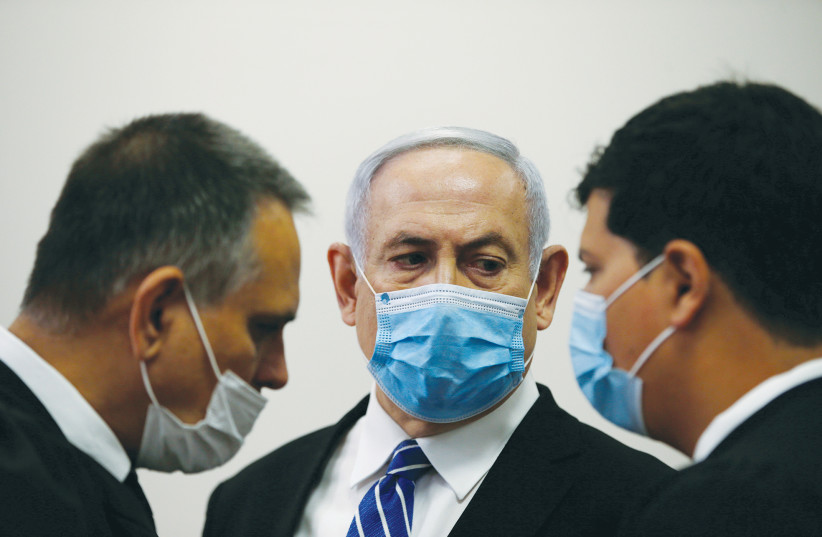A-G Avichai Mandelblit seems only likely to agree to deal with jail time, a sharp break from previous position; PM demands indictment be amended
YONAH JEREMY BOB

There is little chance Attorney-General Avichai Mandelblit will give Prime Minister Benjamin Netanyahu a plea bargain deal that would allow him to avoid a public corruption trial, The Jerusalem Post has learned. If however, Netanyahu requests a deal, it seems strongly likely that Mandelblit will only agree to one that includes jail time, despite pro forma denials of specific conditions.
This was a break from what sources had told The Post in 2018 when claiming, at the time, that there was a readiness in the Justice Ministry to cut a plea deal with Netanyahu that would have likely included a conviction on a lesser charge, a retirement from politics and zero jail time. Now, that is no longer the case.
Yisrael Beytenu Party leader Avigdor Liberman and other politicians have speculated throughout 2020 that Netanyahu’s trial will never be completed since the prime minister will cut a deal beforehand.
Their evidence is that Netanyahu has been lackadaisical about preparing for his trial – changing his main lawyer three times since May – that he must be banking on a deal possibly even before witnesses are called. Another option is that Netanyahu will allow the trial to resume, will assess his chances of securing an acquittal as it goes along, and then make a decision about a deal.
This might have played out for Netanyahu in 2018, before a final indictment decision was issued and he began his non-stop attacks against Israel’s criminal justice system, including personal assaults against Mandelblit. At the time, the attorney general was more open to trying to save the country from a trial of another prime minister.
However, the Post has now learned that given a combination of factors, Mandelblit’s current inclination is to have the nation hear the court render a clear verdict in the bribery case against Netanyahu. With that said though, he has not completely closed the door to a deal in the event that Netanyahu comes asking for one.
Mandelblit believes that there has been so much noise and spin-doctoring around the cases against the prime minister, that it is in the public’s interest for the courts to render a final decision which is beyond partisan dispute. His hope is that a court decision would also clarify that media bribery is a charge which politicians must take seriously. Netanyahu has claimed that there is no such thing as media bribery.
if(window.location.pathname.indexOf(“647856”) != -1) {console.log(“hedva connatix”);document.getElementsByClassName(“divConnatix”)[0].style.display =”none”;}
While the attorney-general has denied any conditions, such as jail time, regarding a potential deal, it is hard to see him agreeing to a plea bargain relating to the bribery case without jail time, when he and the prosecution are confident that Netanyahu will be convicted.
For former prime minister Ehud Olmert, bribery charges meant an 18-month prison sentence (his full sentence was longer because it included other convictions), and that was after the Supreme Court cut it down from the original six-year sentence.
Another reason Mandelblit may be less interested in a plea bargain now is that much of what he had hoped to avoid has already transpired.
There is an almost constant war of words, and sometimes even threats, by Netanyahu and his supporters against Mandelblit and the prosecution.
It is too late to avoid the national friction that he might have wanted to avoid, so there is less to gain from not plowing forward with the trial.
Finally, the Mandelblit of 2018 is not the Mandelblit of 2020.
If back then, the attorney general might have thought that offering olive branches and showing flexibility would have generated goodwill with Netanyahu, it is clear that he now believes that only an unmistakably firm stance will ensure that Netanyahu complies with the judicial system.
Meanwhile, on Wednesday Netanyahu’s lawyers, Boaz Ben Tzur and Amit Hadad filed an unusual motion to compel the prosecution to amend the indictment.
Typically, the prosecution may seek to amend an indictment, while the defense will seek to deny or cancel it, but not to amend it.
According to Netanyahu’s defense team, there were two main bases for the motion.
One was that in Case 4000, the Bezeq-Walla Affair, the indictment does not always properly distinguish between what actions were undertaken by Netanyahu himself, and what actions were undertaken by his wife, Sara, or son, Yair.
In some instances, the indictment merely refers to the Netanyahu family as taking certain actions.
The defense said that the prosecution must give much greater specificity so that the defense can know exactly which charges it is trying to rebut regarding the prime minister, as opposed to his family members who are not defendants.
In Case 1000, the Illegal Gifts Affair, the defense said that the indictment makes general statements about gift giving by a group of people over time to Netanyahu or members of his family.
The defense demands that the prosecution define exactly what gifts were allegedly illegally given to the prime minister, as opposed to others, who exactly gave them and exact dates on which they were given.
Without this information, the defense said that it would not be able to respond to the indictment on November 29 as scheduled.
Content retrieved from: https://www.jpost.com/breaking-news/netanyahus-attorneys-file-request-for-revision-of-indictment-648794.